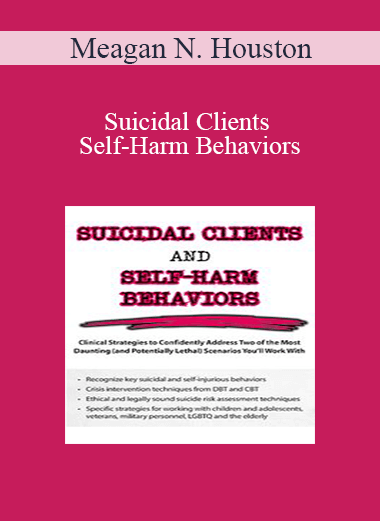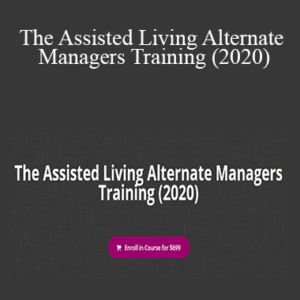- Faculty:
- Meagan N. Houston
- Duration:
- 6 Hours 2 Minutes
- Format:
- Audio and Video
- Copyright:
- Sep 13, 2018
Description
| Manual – Suicidal Clients and Self-Harm Behaviors (3.99 MB) | 72 Pages | Available after Purchase | |
| Illinois Educators Self-Study Instructions (0.02 MB) | Available after Purchase | ||
| Illinois Educators Evaluation Form (0.17 MB) | Available after Purchase |
Outline
Clients at Risk:
Co-Occurring Disorders and Special Populations
- Depressive disorders
- Anxiety disorders
- Trauma and stressor related disorders
- Substance-related and addictive disorders
- Risks in special population groups
- adolescents, veterans, LGBTQ, and the elderly
The Relationship between Suicide and Self-Destructive Behavior
- Non-Suicidal Self Injury (NSSI)
- The latest research on what drives self-harming behavior
- Is self-harm an attention-seeking behavior?
- Does self-harm lead to suicide?
- The question of intent
- Maladaptive coping mechanisms and avoidance
- Clinical screening approach for NSSI
Legally Sound Suicide Risk Assessment
- 10 essential components of a thorough risk assessment
- Chronic and acute risk factors
- Distinguishing morbid ideation vs. suicidal ideation
- Imminent/chronic suicide risk
- Self-care and consultation
- Formal assessment tools for suicide
Manage Self-Harm Behaviors and Build Functional Coping Skills in Your Clients
- Dialectical Behavior Therapy
- Teach clients techniques to increase awareness of impulsive behavior
- Communication and expressing avoided emotions
- Replacement behaviors
- Research limitations and treatment risks of psychotherapeutic approaches
Suicidal Behavior Treatment Strategies: CBT, DBT and Crisis Management Skills
- Strategies to manage countertransference
- Integrate the four key elements of crisis intervention into treatment
- Strategies from CBT and DBT
- Psychopharmacological intervention and management
- Long-term care concerns and strategies
- Tele-therapy & Social media
- APA Guidelines
- Texting – should you?
- What to do when the suicidal client contacts you by phone/social media?
- Research limitations and treatment risks of psychotherapeutic approaches
When (and How) to Hospitalize Clients
- Ethical, legal implications and case studies
- Confidentiality and minor clients
- Informed consent and state-specific laws
- Voluntary vs. involuntary commitment
- When and how to use law enforcement
Please Note: PESI is not affiliated or associated with Marsha M. Linehan, PhD, ABPP, or her organizations.
Faculty
Meagan N. Houston, Ph.D., SAP Related seminars and products: 3
Meagan N. Houston, Ph.D., SAP, has specialized in providing suicide treatment in a wide variety of settings and populations for over a decade. She has experience in high-risk settings where the application of suicide prevention, assessment, and intervention occurs daily. Dr. Houston treats clients who present with a variety of psychological and behavioral disorders – which lend themselves to acute and chronic suicidality. She emphasizes the use of empirically-based approaches when conducting suicide risk assessments. She has also provided her expertise in the area of treating suicidal clients and self-harm behaviors, as the published author of Treating Suicidal Clients and Self-Harm Behaviors: Assessments, Worksheets & Guides for Interventions and Long-Term Care (PESI, 2017).
Dr. Houston is employed full time with the Houston Police Department Psychological Services Division, and maintains a part-time private practice in Houston, Texas. She has also worked in the federal prison system. In addition, Dr. Houston has provided psychological, psychoeducational, and chemical dependency programs at private practices and college counseling centers. She has also provided geropsychological services to nursing homes and rehabilitation facilities.
Speaker Disclosures:
Financial: Meagan Houston is in private practice. She receives a speaking honorarium from PESI, Inc.
Non-financial: Meagan Houston has no relevant non-financial relationship to disclose.
Delivery Method
– After your purchase, you’ll see a View your orders link which goes to the Downloads page. Here, you can download all the files associated with your order.
– Downloads are available once your payment is confirmed, we’ll also send you a download notification email separate from any transaction notification emails you receivefrom coursesblock.com
– Since it is a digital copy, our suggestion is to download and save it to your hard drive. In case the link is broken for any reason, please contact us and we will resend the new download link.
– If you cannot find the download link, please don’t worry about that. We will update and notify you as soon as possible at 8:00 AM – 8:00 PM (UTC 8).
Thank You For Shopping With Us!







